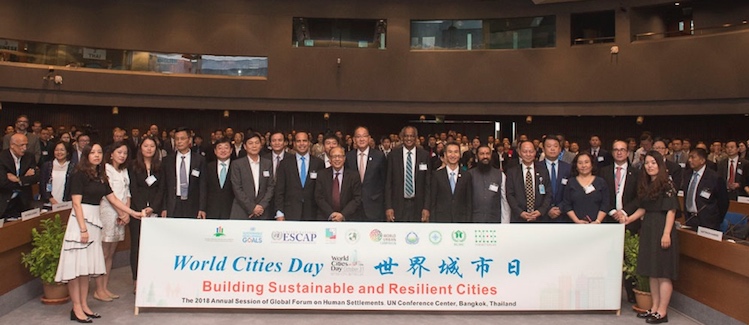By Caroline Mwanga
NEW YORK | BANGKOK (IDN) – The Global Forum on Human Settlements (GFHS) 2018 has called for greater efforts to speed up the transition to green growth through developing a circular economy, scaling-up financing for sustainable urban infrastructure, sustainably managing urban water, applying innovative technologies for smart cities, building enhanced partnership and creating international green model cities.
GFHS enjoys a special consultative status with the United Nations Economic and Social Council (ECOSOC).
The two-day meeting organized under the theme Advancing Urban Innovations to Achieve SDG 11 and New Urban Agenda concluded on October 31 at the United Nations Economic and Social Commission for Asia and the Pacific (ESCAP) in Bangkok as participants gathered to commemorate World Cities Day.
The Forum drew over 400 participants from more than 40 countries to conclude the observance of Urban October. Sustainable Development Goal (SDG) 11: Sustainable Cities and Communities is a cornerstone of localizing the 17 SDGs.
High-level stakeholders expressed commitments to support sustainable and resilient cities through innovation, green growth and well-designed policies to maximize the benefits of local actions. Ms. Maimunah Mohd Sharif, UN Under-Secretary-General and Executive Director of UN-Habitat delivered a video message, recognizing GFHS’s efforts and contribution to promoting sustainable cities and human settlements over the past decade.
As a highlight of the Forum, the Sustainable Cities and Human Settlements Awards (SCAHSA) were presented to 36 winners including the city of Hua Hin, Thailand, the city of Indore, India, Kalundborg Symbiosis, Denmark, Qingdao Sino-German Ecopark, China, Arcadis Shelter Program, among others. The awarded practices have made significant contributions to sustainable cities and human settlements for all.
Opening the Forum, ESCAP Officer-in- Charge Hongjoo Hahm emphasized that “innovation as a strategic investment offering benefits to all stakeholders. Our vision of future cities can be powerful. We recognize that cities, supported by strong partners, can foster innovation and build great communities.”
If we are successful in working toward the objectives of the 2030 Agenda and the New Urban Agenda, said Hahm, we will reshape the cities of the Asia-Pacific region, so they look and function very differently than they do today.
While the SDGs are global, uniting diverse stakeholders is integral to making them a reality and determining the future of urban environments. “If we are successful in working toward the objectives of the 2030 Agenda and the New Urban Agenda, we will reshape the cities of the Asia-Pacific region, so they look and function very differently than they do today,” Hahm continued.
Ambassador Anwarul K. Chowdhury, Chairman of GFHS, Former UN Under-Secretary-General and High Representative highlighted that the magnitude of urban challenges can be overcome to foster parallel opportunities.
It was encouraging that the world leaders adopted by consensus in September 2015 the United Nations 2030 Agenda for Sustainable Development, which included among its 17 Sustainable Development Goals (SDGs), a specific goal – Goal 11 – to make cities and human settlements inclusive, safe, resilient and sustainable, said Ambassador Chowdhury.
“Urbanization offers unprecedented opportunities for increasing living standards, life expectancy and literacy levels, environmental sustainability and more efficient use of increasingly scarce natural resources. For women, urbanization is associated with greater access to employment opportunities, lower fertility levels and increased independence,” he added.
Chowdhury assured that the GFHS strongly advocates for enhanced lasting partnership which not only echoes with SDG 17, but also calls for breaking the political, economic, social, gender and even geographic hierarchy and build up comprehensive, cooperative, pragmatic and equal partnership. This will facilitate implementation of SDGs and New Urban Agenda.
The Forum was organized by the Global Forum on Human Settlements with support from ESCAP, in cooperation among others with the Global One Belt One Road Association (GOBA), World Association of Non-Governmental Organizations (WANGO), Universal Peace Federation (UPF) and other organizations. [IDN-InDepthNews – 06 November 2018]
Photo: Participants in the opening session. Credit: Global Forum on Human Settlements.
IDN is flagship agency of the International Press Syndicate.
facebook.com/IDN.GoingDeeper – twitter.com/InDepthNews

